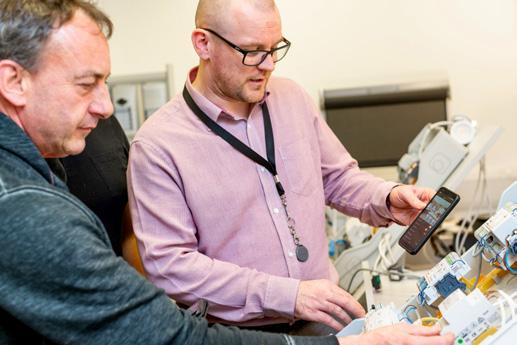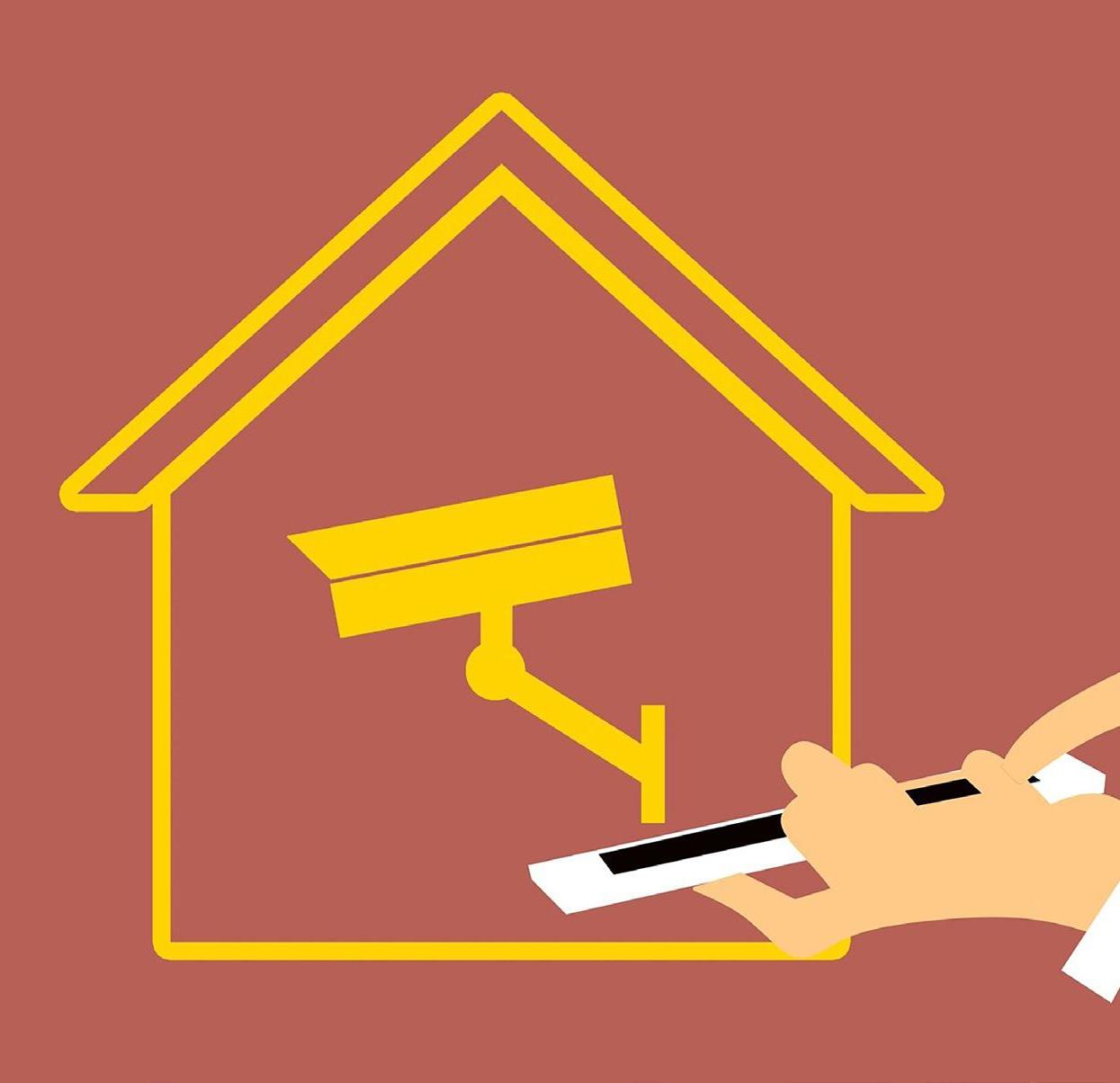
8 minute read
Smart Tech
Getting smart with the latest technology
Richard Hopkins, lead marketing manager at Legrand UK and Ireland, outlines the opportunities for electrical professionals to become a primary source of knowledge in the smart technology market.
Advertisement
e are in the midst of a smart technology revolution. As conW sumers become aware of the possibility of smart devices and systems, there is a growing expectation for them to be implemented into our nation’s buildings. While many search online to discern what technology is available, without technical understanding it can be difficult to fully understand what the full breadth of smart products can deliver when fully integrated.
Demand for smart technology is growing. According to a recent survey of 1,000 consumers, two thirds of people have a smart device in their home, and over half of respondents were planning on purchasing more devices in the near future. Using phrases such as ‘exciting’, ‘interesting’ or ‘revolutionary’, 65% described smart technology positively, so it is clear that demand for the technology is present.
However, the survey also revealed that 68% of respondents would turn to the internet to find out more about smart technology, while only 14% would approach their electrician. While the internet is a helpful place to understand the benefits, features and aesthetics of individual devices, it can be difficult to explore how products can be integrated and connected in smart building scenes.
With smart technology growing so quickly, electrical professionals now have an opportunity to capitalise on this demand and become the source of smart tech knowledge. By understanding the intricacies of smart products and how they can interconnect within a building, electrical contractors and installers can offer bespoke advice and installations to fit exacting customer requirements. However, what can professionals in the industry do to become experts in smart technology?
Residential smart buildings To be able to offer the most appropriate service, it is first important for electrical professionals to be aware of what technology is currently available. A number of home functions can be enhanced and automated with smart devices, working together in scenes controllable with smartphone apps or central control panels.
As we approach the winter months, consumers will be looking for innovations to intelligently heat their homes. Smart thermostats, radiator valves and outdoor weather sensors can be interconnected as part of a smart home scene, heating a home exactly when occupants require it as weather and occupant habits vary during the winter. This includes heating earlier to reach the chosen setpoint temperature at the exact time indicated in the heating schedule. As the smart system learns specific characteristics of the home and accumulated weather data, the system can optimise space heating in the home and increase overall efficiency.
Smart lighting is also available for integration in a home automation scene. Controllable through the same system, the lighting can be programmed to turn on and off remotely and with changes in daylight. In situations where occupants are rushing to work or going on holiday, there is no questioning whether they switched all their lights off. Reducing unnecessary lighting use also lowers consumption, a particularly helpful cost saving feature for an increasingly environmentally-aware and sustainable population.
To broach security concerns of residential end-users, smart camera systems can be installed easily to the interior and exterior of a property. Some smart cameras can detect different types of movement, be it a person, animal, vehicle or just harmless movement from an object. It can even use facial recognition to discern whether to send alerts to the end-user’s smartphone,

or trigger an inbuilt siren with certain devices. Smart lighting can also be programmed to work in tandem with such camera systems, to further deter intruders and make footage clearer for end-users.
On top of these technologies, it is also possible to integrate audio systems, door and gate entry, and even control blinds and curtains within the same house. While consumers may feel they understand each device in isolation, they may need the services of an electrical professional when it comes to interconnecting the entire system and choosing which of these devices they truly require. This is where the opportunity for electrical professionals can be found.
Getting trained Clearly electrical professionals are likely to be seeing increased demand from their customers for smart technology installations. A concern for many installers is that this will require vast amounts of extra knowledge and training. As workloads increase and time is at a premium, electrical installers and contractors need training to fit into their busy working schedules.
Whether installing a few smart devices or creating an entire automated building, electrical installers can usually upskill quickly and easily. Various companies have designed different training courses with electrical professionals in mind, helping those installing smart building technology to define the solutions that are right for their customer’s requirements.
While smart devices and systems continue to become commonplace, electrical professionals can use such training to become a trusted source of smart technology knowledge. Whether working on residential or commercial developments, they can be armed with everything to offer bespoke and project-specific advice and products to clients.
In such a consumer-led market, staying ahead of smart technology growth and being proactive in growing knowledge and competence is important for all contractors and installers. Now is the time to take the opportunity to upskill and broaden working opportunities with smart tech.
The future of smart installers

With the demand for smart homes increasing, Ali Bullough, technical trainer at JTL, discusses the importance of an electrician’s understanding of the smart home market and how they can go about gaining this knowledge.
A
ccording to Smart Home Week, there are now 15 million ‘smart homes’ in Britain, with its 2019 survey revealing that 57% of homes now have some sort of device to control appliances, while one in six are using smart tech remotely.
The Internet of Things (IoT) Smart home technology is becoming more accessible to many UK households, giving rise to the term ‘home automation’, which refers to the enabling of the remote access of devices inside a household.
As a result, it now means that we can monitor and adjust various controls remotely, including lighting, temperature, domestic appliances and security needs within our home. Home automation is reliant on the internet and as such, a term has been coined to describe this interconnectivity: the Internet of Things (IoT), which provides a platform for devices to communicate and interact with each other.
Home automation began with features designed to save time and effort. This has now advanced into devices that can be controlled by artificial intelligence, such as Amazon’s Alexa, but the IoT is continually

Electric vehicle charging growing. Efficiency is one of the main benefits of using home automation. Devices that can be controlled with pre-sets can have more energy saving benefits as they can turn themselves off when not in use. Assisted living solutions The Internet of Things has also been utilised for automated assistance for people with disabilities or elderly people. For example, people with disabilities who may have sight limitations can be guided with voice control. There are also motion sensing capabilities for seizure and accident emergencies.
Additionally, living room hubs can be used as a safety measure at home. Elderly people can be monitored with the help of security cameras and smartphones can then be used to access the video footage at any given time. The electric vehicle and hybrid market is growing rapidly in the UK. There are more than 136,000 pure electric vehicles on the road right now in the UK and over 330,000 plug in hybrids (PHEVs). If you include PHEVs with full EVs, they account for almost one in ten new vehicles currently registered in the UK.
There are currently over 30,000 electric charging points publicly available in the UK. This is up from previous years, but is still 0.06 chargers per EV/PHEV vehicle on the road. This needs to increase rapidly to meet the demand of EVs.
There are also only just over 7,000 rapid chargers (50KW and above) in the UK, an area in dire need of expansion, as they are the only chargers that can effectively provide enough charge to continue travelling in under an hour. With high demand and lack of supply, the opportunity to install electric vehicle charging points as part of the smart home system, certainly forms the mindsight of what future homes look like.
reality for many households The future of homes is big business The Internet of Things, digital lighting and the growing demand for home automation in general, gives way for the traditional electrician to seize these opportunities and become the go-to smart installer. Historically, the home automation market was focused on the ultra-high-end customer, but is now an affordable reality for many households. Plus, as prices continue to come down, the market will speed up.
In the UK in 2018, the combined spend on home automation, security and assisted living solutions was estimated at £800 million, with an expectant growth just shy of 30% annually until 2021. The Internet of Things and the growing demand for home automation in general, is a long-term opportunity for electricians and an area worth upskilling in.
As an electrician, being involved with home automation is the ideal opportunity to develop your business, as you can increase the value of projects and take advantage of upselling opportunities, significantly increasing your profit earning potential.
If you are looking at upskilling and becoming an expert in home automation then there are no shortcuts, so it is recommended that you identify your knowledge gaps, whether that’s in heating or security, and train accordingly. It is advisable that you opt for a flexible training course that doesn’t lock you or your customer into one manufacturer.
So, if you’re interested in learning about the future of smart technology in the home, or growing your understanding of electric vehicles and what is required for safe, compliant electric vehicle charger installations, there are a variety of certified training courses throughout the UK so you can choose the one that’s best for you.








